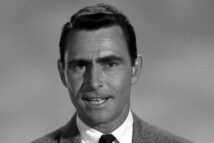Rod Serling
A former boxer, paratrooper and general all-around angry young man, Rod Serling was one of the radical new voices that made the "Golden Age" of television. Long before The Twilight Zone (1959), he was known for writing such high-quality scripts as "Patterns" and "Requiem for a Heavyweight," both later turned into films (Patterns (1956) and Requiem for a Heavyweight (1962)). The Twilight Zone (1959) featured forays into controversial grounds like racism, Cold War paranoia and the horrors of war. His maverick attitude eventually drove him from regular network television.
A copy writer from Syracuse, New York, Rod Serling toiled for years as an unproduced screenwriter. Then in 1956, his 72nd screenplay, the intense corporate drama "Patterns", was broadcast live (as most television was back then) on NBC's B&W "Kraft Television Theatre". This won Serling an Emmy Award. He won a second statuette the following year, 1957, for "Requiem for a Heavyweight", which starred Jack Palance as a washed-up prizefighter. Newly minted as the most celebrated writer in a hot new medium, Serling moved his family to California where the television industry was exploding. Once in Los Angeles, he quickly grew frustrated by how much sway corporate sponsors had over his content. So Serling hatched a plan: Since science fiction seemed to fly past network censors, he had create an anthology series in that genre, using it to smuggle through some big ideas about politics, racism and the human condition. Everything about "The Twilight Zone" - from its unsettling Marius Constant score to its Joe Messerli-designed logo to Serling himself as the guide into the unknown - is now immutably iconic. The show-series ran on CBS from 1959 to 1964, picking up two Emmy Awards in 1960 and 1961 for Serling's writing. A lifelong smoker, he died June 28, 1975, of a heart attack during open-heart surgery. He was age 50.

